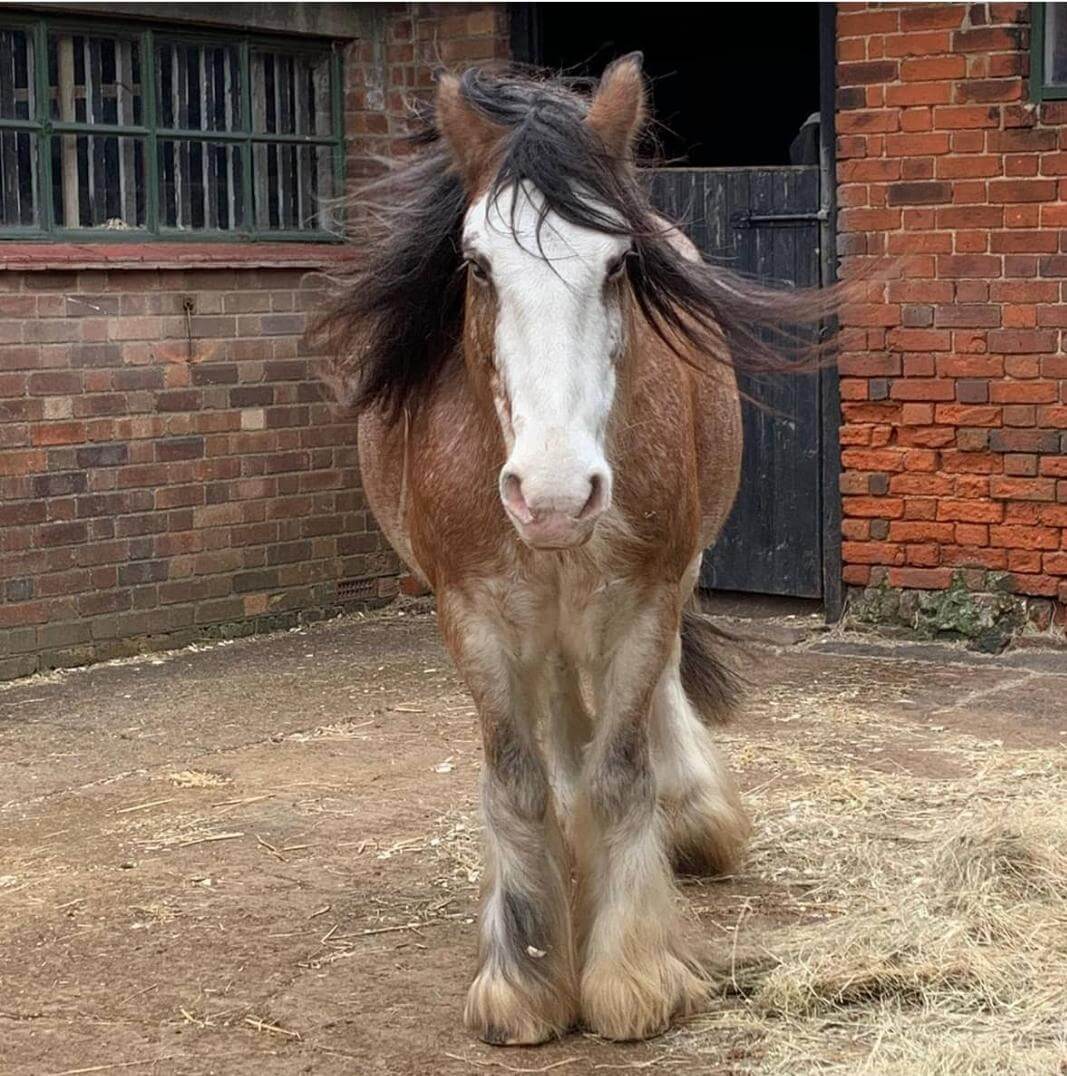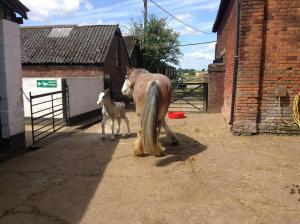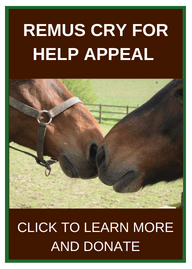


The True Cost of Horse Ownership
Keeping a horse is not a cheap hobby – and with the cost of living crisis, the expense of horse ownership has never been more keenly discussed.
At Remus we sadly often see the results when owners cannot afford to keep horses properly – whether they come to us because corners have been cut in their health and welfare, or whether owners are looking to rehome because they can no longer afford to keep their horses amid rising bills or a change in personal circumstances.
That’s why we make it part of our mission to educate would-be owners on the true costs of the hobby. Along with the actual purchase cost of your animal, there are insurance premiums to be paid, vets bills, feed, hay and livery if you don’t have your own place to keep your horse. That’s before you add in the cost of tack and other kit, transport and lessons.
The excellent Horse and Hound feature at www.horseandhound.co.uk/features/10-ways-save-money-livery-bill-431963 lists some ways to help keep costs down, including sharing costs with other owners, selling unwanted tack, taking on jobs at the livery yard, and sharing rarely needed kit and transport costs.
It’s important to note that none of these ideas sacrifice the quality of care and welfare for your animal – a concern that should always be uppermost in owners’ minds.
If you are paying for livery, although cost will be a major consideration, you should also ensure that corners are not being cut to get that good deal. Find out more about the true cost of livery at www.horseandhound.co.uk/news/why-owners-and-livery-yards-must-appreciate-the-true-cost-of-keeping-horses.
This year Remus is celebrating its 40th anniversary. If you’ve not yet done so, please take a look at our 40th Anniversary Challenge and share with your friends and family to help us achieve our mission.
Help your Horse Beat the Heat
As summer continues, and with another heatwave predicted for the UK, it’s important to ensure your horse is well protected against the elements and any pests.
Keeping on top of horse care is half the battle, and we have in place at Remus Horse Sanctuary a summer management routine that ensures that the animals we look after are kept well during this time.
One of the major issues is flies – a real problem in horse yards – and a pest to your horse. A fly repellent and fly rug and mask will help your animal cope.
Another pest to tackle is the Culicoides midge, which can cause a common skin condition called sweet itch, which can make skin itchy and scaly. Stabling your horse between dusk and dawn is one way to avoid this.
As horse owners, we may enjoy not having to wade through mud during the summer months to look after our animals, but the hard ground can also be an issue. It’s important to be aware of the effect hard ground can have on their feet – a regular farrier routine is a must at this time of year.
Finally, when the weather hots up, horses need to be protected from the sun, just like us. You can use a sunscreen or UV-protection fly mask. Be especially careful with light-skinned animals.
There is more detailed advice in this excellent article www.horseandrideruk.com/expert-advice/articles/keep-horse-safe-summer, which should help you keep your horse happy and healthy all summer long.
Rain, rain go away
It might be August, but that hasn’t stopped the heavy rain showers and fluctuating temperatures we’ve been experiencing so far this month! If you’ve been pulling your hair out not knowing whether to put a fly sheet or a lightweight rug on your horse in the mornings, you’re not alone!
Unfortunately, our horses can be at risk of rain scald when the weather is so wet. Although it’s usually more common in the winter months, this common skin disease thrives in periods of wet weather with warm temperatures and high humidity – a lot like we’ve been experiencing recently!
It’s caused by the same bacteria that causes mud fever on legs. The bacteria originates in the soil and can be passed from horse to horse by flies, or by sharing rugs and grooming equipment. It does well in warm environments, so on horses with long coats and who aren’t regularly groomed, much like many of those we see come into us here at Remus.
Something else you may not know about rain scald is that lighter coloured equines, including palominos, greys and coloureds, are more at risk, as well as young and old horses whose immune systems are not fully functioning.
Find out more, how to spot it and how to treat it, in this article from Horse & Rider magazine: www.horseandrideruk.com/expert-advice/articles/rain-scald
We need your help to continue for our horses, ponies and donkeys – find out about our fundraising challenge and get those running or walking boots on!
It’s Double Donations Week at @giveasyoulive – that means when you shop as normal at selected retailers, we receive 2x the normal donation, for free! See the full list of retailers and generate free funds for us, just click on the image below.
The Battle with Ragwort
As pretty as it looks, Ragwort can give landowners and horse owners alike a real headache. We’ve all heard about it, but how much do you really know about its part in the world?
Ragwort contains toxic compounds, which can cause irreversible liver damage to horses. This can happen if it’s eaten fresh, but also dry in hay or haylage, so it’s important to check any hay you’re feeding, as well as your fields. The plant flowers from May to October and there has been a lot of talk in the news over the last couple of months about just how rampant Ragwort is becoming across the UK.
While we obviously want to keep our fields clear of Ragwort for our horses’ wellbeing, under the Weeds Act of 1959, the occupier of the land is actually legally responsible for clearing it. Visit the government website for the latest guidance on how you can safely help stop Ragwort from spreading: www.gov.uk/guidance/stop-ragwort-and-other-harmful-weeds-from-spreading.
Conservation is extremely important to us at Remus. We occupy 40 acres of Essex countryside and actively develop small areas of land and corridors of conservation to benefit plant life and wild creatures. Did you know the cinnabar caterpillar feeds on Ragwort? It’s actually their favourite food! So while we’re certainly not anti-wildlife, it is important that we follow the right guidance to keep our paddocks and grazing land safe for everyone.
There is a helpful Q&A all about Ragwort on the Horse & Country website: https://horseandcountry.tv/en-us/ragwort-horse-owner-know/.
Sun care for horses
The heatwave may be over for now, but the hot weather we experienced last month led to a lot of problems in many animals, according to vets. We didn’t escape here at Remus either, with two ponies going down with colic and one with a chest infection. Thankfully, they are all now doing well.
Issues such as laminitis, heat stroke and fly irritation are all things horse owners worry about during the warmer weather. Perhaps one we don’t think about as much as we should is sunburn. You only have to check the weather forecast to see UV level warnings and a reminder to put on the suncream, but sunburn is a real risk to our horses too. Just like us, they have varying tolerances to UV rays, meaning some will burn quicker than others.
If you have a grey horse with light coloured skin they will have less melanin pigment, which is what helps to absorb the UV light, and therefore be more susceptible to burning. Muzzle areas are most commonly affected, but don’t forget other hairless areas such as the pastern joints, and potentially parts of the crest or dock where hair has been rubbed away.
Sunburn is not the only concern. Photosensitisation is an abnormal reaction of the skin to sunlight and can cause further internal problems, so sun protection is really important for our horses.
You can find out more about sunburn and photosensitisation in this article from Your Horse: www.yourhorse.co.uk/advice/vet-advice/articles/managing-sunburn-and-photosensitisation.
There are a number of ways you can help us care for our horses here at Remus:
- Sponsor an animal for just £2 a month or £25 a year
- Buy Feed
- Make a donation
Warnings Over Equine Obesity
Our horses’ weights are often at the forefront of our minds this time of year – especially when we’re getting more rain than sunshine, and can see the grass getting its second wind!
While, here at Remus, much of our concern is keeping weight on some of the older horses – and indeed taking in horses who have not been given access to suitable food and forage – we’re very aware of the dangers of equine obesity, in terms of laminitis and injuries to tendons and ligaments due to the extra pressure.
There have been a number of stories in the equestrian media on obesity, with warnings from vets who have had to put horses down and who believe owners’ attitudes to excess weight need to change.
Thankfully it seems that awareness is growing. There’s a horse show up north that recently had a vet award horses of the healthiest weight in its in-hand showing classes. It was the brainchild of Tamzin Furtado, who has recently completed a PhD on equine obesity and says owners can find it quite hard to recognise appropriate body shape.
You can read the whole story here.
If you would like to come and meet our animals and learn more about the work we do at Remus Horse Sanctuary, our next Open Day with fun dog show will be taking place on Sunday 7 July. You can find more details on that here.
Identifying and Dealing with Horse Fly Bites this Summer
Flies are an ever-present pest during the summer, and horse fly bites are a particular problem for both horses and their riders.
Horse and Hound Magazine say “Biting flies can pierce the horse’s skin and feed on its blood, while nuisance flies lay secretions in and around the horse’s eye, mouth, nose and other sensitive spots.
“Flies can carry disease and an allergic reaction can result from any fly bite, while all flies cause annoyance and irritation to horses and humans alike – an important consideration when working or competing with horses.”
The article lists the types of flies that cause trouble, such as Horse flies, Black flies, Midges and Stable Flies and how to treat them.
Read the full article here.
If you have any queries about horse welfare, please do get in touch by emailing: info@remussanctuary.org.











